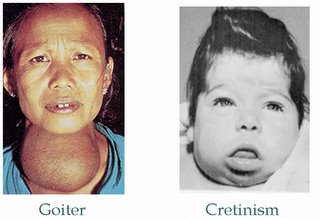Those who know me well online are aware that whenever I hear anybody utter the "it's natural so it must be good for you" line I am fond of muttering darkly about whether they'd like a cup of fresh-from-my-pesticide-free-garden foxglove tea.
On the other side of the room. To the potplants.
On the other side of the room. To the potplants.
Because nearly everyone I know in real life buys it. They really believe that taking a purified chemical tablet is worse for them when they have a headache than sipping herbal tea. [*cough* willowbark *cough*] When the school has a headlice outbreak, the debate soon turns away from which treatments work best to which treatments are most "natural"[1].

Well, buying "natural" rock salt for our table like all the gourmet chefs recommend, or "natural" grained table-salt because it sounds purer, is a habit that could well bite us all in the arse. Because a study released last week in the Medical Journal of Australia shows that as many as one in two Australian children are suffering from iodine deficiency, and this finding is likely to be replicated across most of the Western world. I'll just repeat that figure: one in two.
"This deficiency can lead to serious health problems including brain damage, stunted growth and deafness.
The findings are co-authored by one of Australia's leading endocrinologists,
Professor Cres Eastman, who says authorities are reacting slowly to his
urgent calls for mandatory iodised salt.
Adding the mineral to salt is the simplest and most effective method of
preventing the range of iodine deficiency disorders.
But Professor Eastman says iodine is added to only 10 per cent of Australian
salt in contravention of a World Health Organisation recommendation that all
salt be iodised."
Below is what people with severe iodine deficiency look like. Cretinism occurs when people suffer severe iodine deficiency in infancy, leading to a lifetime of mental retardation. Then there is the more common goitre, which is a sign of iodine deficiency in later life.

But these serious and visible conditions are easily preventable with tiny regular doses of iodine, so that we rarely see these conditions in the West. However, iodine deficiency still can have a serious effect on brain development and general zest for life without showing obvious external signs of any abnormality. Welcome to a world of lethargic kids who seem to be 10-15 IQ points lower than we might expect - it might not just be your imagination that kids today are slow in more ways than one.
IDD PROBLEM PYRAMID

The above pyramid illustrates the fact that the visible effects of IDD (cretinism) account for only as much as 10% of the ramifications. At least 90% of IDD consequences remain hidden.
But this problem is one that we thought we'd fixed in the West since the industrial revolution. For most of last century people eating a normal Western diet had no problem with iodine deficiency, not because more table salt was iodised, but because of chemical contamination from another part of the food industry entirely:
I don't know whether the dairy industry switched away from iodine-based disinfectants to something more "natural", or at least that left fewer chemical contaminants so that the milk products are perceived as more "natural", but I wouldn't be at all surprised.
Anyway, I checked out the salt in our supermarket. I've always bought iodised grain salt, but have been seduced by the rock/sea salt fad. I am glad to say that I found iodised rock salt for my salt grinder, so all is now right with my gourmet world.
"Professor Eastman says it's because the dairy industry is no longer using
iodine-based disinfectants to clean milk bottles."
I don't know whether the dairy industry switched away from iodine-based disinfectants to something more "natural", or at least that left fewer chemical contaminants so that the milk products are perceived as more "natural", but I wouldn't be at all surprised.
Anyway, I checked out the salt in our supermarket. I've always bought iodised grain salt, but have been seduced by the rock/sea salt fad. I am glad to say that I found iodised rock salt for my salt grinder, so all is now right with my gourmet world.
More here: [link][link][link]
1. Headlice treatment: the most effective, both time and expense-wise, seems to be washing hair with nasty purpose-made chemicals once to kill lice/nits once, then smothering huge gobs of the nastiest cheapest generic hair conditioner (full of chemicals) onto the hair and combing through, then leaving conditioner in hair. Repeat conditioner application/comb-through every two days for a week while washing all soft furnishings infested head has been near in hot-hot water and bleach. Yay chemicals!
2 comments:
Like you I've got no time for the "chemical free" type of "natural" argument, but I do like sea salt - Maldon's or a local equivalent. A couple of fave recipes use it, and a flaky crunch salty is just gorgeous in them. I don't otherwise add salt to anything.
I've gone as far as asking in a couple of delis if they have iodine added, and got blank looks. So which rock/sea salt have you found that _does_ have iodine?
From Saxa, in a 500g bag labelled Sea Salt Crystals Iodised, and I bought it in Woolworths.
If you eat plenty of shellfish you're pretty OK for iodine too, but there's lots os places in the world where that's not so easy as it is here in Sydney.
Post a Comment